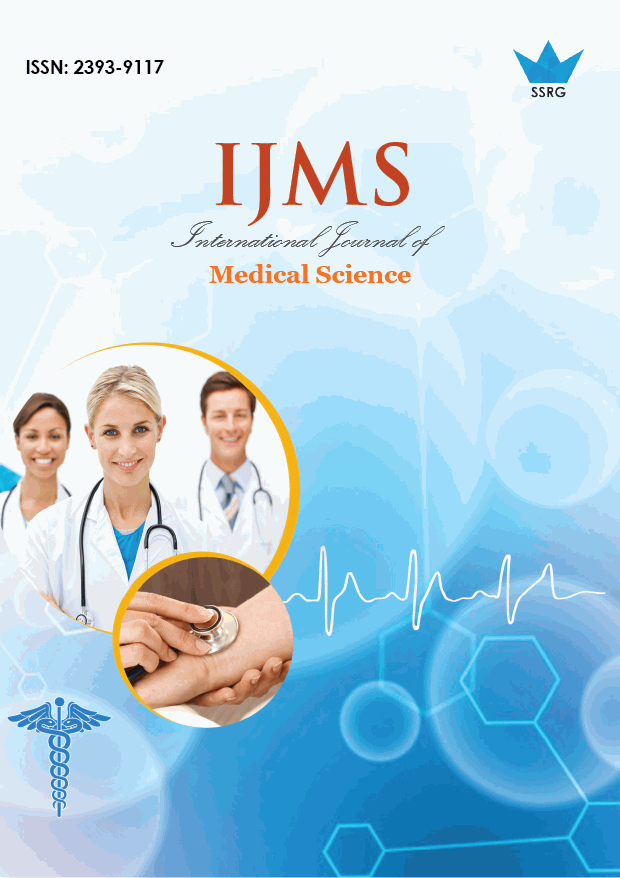The Relationship Between the Blood Group and Susceptibility for COVID-19

| International Journal of Medical Science |
| © 2021 by SSRG - IJMS Journal |
| Volume 8 Issue 6 |
| Year of Publication : 2021 |
| Authors : Dr. Adarsh E., Dr. Malavika J., Dr. Ramya R |
How to Cite?
Dr. Adarsh E., Dr. Malavika J., Dr. Ramya R, "The Relationship Between the Blood Group and Susceptibility for COVID-19," SSRG International Journal of Medical Science, vol. 8, no. 6, pp. 1-4, 2021. Crossref, https://doi.org/10.14445/23939117/IJMS-V8I6P101
Abstract:
Specific ABO blood groups increase the susceptibility of individuals to viruses (e.g. SARS CoV-17 and Novovirus), hence any correlation with SARS CoV-19 is an important predictive index. This study aimed to determine any association between blood group and COVID-19 positive Paediatric patients and their clinical outcome. This retrospective cohort study, in Rajarajeswari Medical College and Hospital, Bangalore. Out of 113 patients admitted during the 4-month period, only 75 had a known blood type. 39 (52.0%) were symptomatic and 36 (48.0%) were asymptomatic. 74 (98.7%) patients received symptomatic treatment whereas 1 (1.3%) required intubation. There were no deaths during the course of this study. 23 (30.7%) were blood type A, 20 (26.7%) were blood type B, 11 (14.7%) were blood type AB and 21 (28.0%) were blood type O. Blood type A and B had higher odds of testing positive (AOR:1.30, CI:1.12-1.65 ; AOR:1.21, CI:0.94-1.38, respectively). Blood group AB had no correlation (AOR:1.00, CI:0.92-1.17). Blood type O had the lowest risk (AOR:0.82, CI:0.49-1.02) Rh+ status was associated with higher odds of testing positive. Blood type was not associated with ICU admission, intubation or death
Keywords:
Blood group, Blood type, COVID-19, SARS-CoV2, Paediatric age group
References:
[1] Coronavirus disease 2019 (COVID-19) Dashboard Overview. World Health Organization. https://covid19.who.int
[2] MoHFW | Home. (2021). https://www.mohfw.gov.in
[3] Zhao J, Yang Y, Huang H, et al. Relationship between the ABO blood group and the COVID-19 susceptibility [published online ahead of print 4 August 2020]. Clin Infect Dis. doi:10.1101/2020.03.11.20031096. https://www.medrxiv.org/ content/10.1101/2020.03.11.20031096v2.full.pdf.
[4] Mike Bogetofte Barnkob, Anton Pottegård, Henrik Støvring, Thure Mors Haunstrup, Keld Homburg, Rune Larsen, Morten Bagge Hansen, Kjell Titlestad, Bitten Aagaard, Bjarne Kuno Møller, Torben Barington; Reduced prevalence of SARS-CoV-2 infection in ABO blood group O. Blood Adv 2020; 4 (20): 4990–4993. doi: https://doi.org/10.1182/bloodadvances.2020002657
[5] Li, J., Wang, X., Chen, J., Cai, Y., Deng, A., & Yang, M. (2020). Association between ABO blood groups and risk of SARS-CoV-2 pneumonia. British journal of haematology, 190(1), 24–27. https://doi.org/10.1111/bjh.16797 Yamamoto F, Cid E, Yamamoto M, Blancher A. ABO research in the modern era of genomics. Transfus Med Rev. 2012;26(2):103-118.
[6] Ryan L. Hoiland, Nicholas A. Fergusson, Anish R. Mitra, Donald E. G. Griesdale, Dana V. Devine, Sophie Stukas, Jennifer Cooper, Sonny Thiara, Denise Foster, Luke Y. C. Chen, Agnes Y. Y. Lee, Edward M. Conway, Cheryl L. Wellington, Mypinder S. Sekhon; The association of ABO blood group with indices of disease severity and multiorgan dysfunction in COVID-19. Blood Adv 2020; 4 (20): 4981–4989. doi: https://doi.org/10.1182/bloodadvances.2020002623
[7] Latz CA, DeCarlo C, Boitano L, et al. Blood type and outcomes in patients with COVID-19. Ann Hematol. 2020;99(9):2113-2118.
[8] Pourali F., Afshari M., Alizadeh-Navaei R., Javidnia J., Moosazadeh M., Hessami A. Relationship between blood group and risk of infection and death in COVID-19: A live meta-analysis. New Microbes New Infect. 2020;37:100743. doi: 10.1016/j.nmni.2020.100743.
[9] Zietz M, Tatonetti NP. Testing the association between blood type and COVID-19 infection, intubation, and death [preprint]. MedRxiv; 2020;2020.04.08.20058073.
[10] Guillon P, Clément M, Sébille V, et al. Inhibition of the interaction between the SARS-CoV spike protein and its cellular receptor by anti-histo-blood group antibodies. Glycobiology. 2008;18(12):1085-1093.
[11] Neil SJD, McKnight A, Gustafsson K, Weiss RA. HIV-1 incorporates ABO histo-blood group antigens that sensitize virions to complement-mediated inactivation. Blood. 2005;105(12):4693-4699.
[12] Sinaei, R., Pezeshki, S., Parvaresh, S. et al. Why COVID-19 is less frequent and severe in children: a narrative review. World J Pediatr 17, 10–20 (2021). https://doi.org/10.1007/s12519-020-00392-y
[13] Qiu H, Wu J, Hong L, Luo Y, Song Q, Chen D. Clinical and epidemiological features of 36 children with coronavirus disease 2019 (COVID-19) in Zhejiang, China: an observational cohort study. Lancet Infect Dis. 2020;20:689–96.
[14] Weisberg SP, Connors T, Zhu Y, Baldwin M, Lin WH, Wontakal S, et al. Antibody responses to SARS-CoV2 are distinct in children with MIS-C compared to adults with COVID-19. medRxiv. 2020. https://doi.org/10.1101/2020.07.12.20151068.

 10.14445/23939117/IJMS-V8I6P101
10.14445/23939117/IJMS-V8I6P101